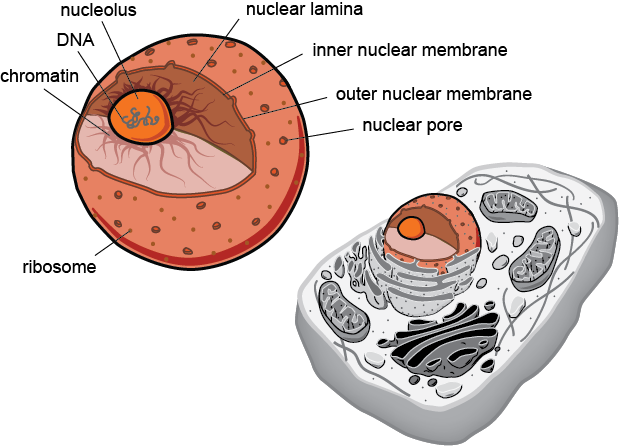Nucleus
Background:
The nucleus was discovered in 1911 by Ernest Rutherford. He discovered that the alpha particles were scattering backwards from the gold foil in his experiment, due to a hard dense core at the centre of the atom-nucleus.
What is the Nucleus and what does it do?
The nucleus also controls all of the activities that take place within the cell.
What is the Nucleus made up of ?
The nucleus is made of 6 main parts (Nucleolus, nuclear envelope, nuclear pores, chromatin, chromosomes and nucleoplasm).
Nucleolus is the centre specialised area of the nucleus responsible for producing ribosomes.
Nuclear Envelope also known as the nuclear membrane is the membrane that surrounds the nucleus making it membrane bound as well as encasing the genetic material in the cell. The membrane is made up of two layers: the inner and the outer nuclear membrane.
Nuclear Pores (the holes all over the nuclear envelope) are protein based passageways that control and regulate the movement of molecules to and from the nucleus to the cytoplasm
so the nuclear pores serve as transportation and communication channels.
so the nuclear pores serve as transportation and communication channels.
Chromatin is groupings of DNA and proteins that condense and as a result form chromosomes.
Chromosomes are a structure in the nucleus made up of a portion of the cell’s DNA and proteins. They are passed from the parents to the off springs and contain the DNA that makes each type of living creature different and unique.
Nucleoplasm is the liquid found in the nucleus. It is completely enclosed within the nuclear envelope and surrounds the chromosomes and nucleoli. It is completely enclosed within the nuclear membrane or nuclear envelope.
Where’s the Nucleus found?
- The Nucleus is found only in
Eukaryotic cells
Facts About the Nucleus
- Largest cellular organelle in animal cells
- It can contain up to about 2 metres of DNA
- The nucleus was the first of the cell organelles to be discovered by scientists

Prokaryotic cells do not have them, they do not need them. Is this really the most important organelle then? I think not...
ReplyDeleteYou make a good point, however prokaryotic cells are little with limited abilities. When you have a cell with a nucleus, the cell has more abilities and the nucleus controls the whole cell, therefore without it the cell would die. Also, Eukaryotic cells are what make up the human body, therefore they are more relevant to us. A cell with a nucleus is more complex than one without.
DeleteJust FYI, Ernest Rutherford discovered the nucleus of an atom, not a cell...
ReplyDeleteThat may be true, however just because peroxisomes take up more space within the cell, doesn't mean they are more important. The nucleus controls all of the cells activities and stores all of its imformation. Without the nucleus, the cell would die and that means your peroxisomes wouldn't be able to carry out their functions.
DeleteWhile the nucleus may be the largest cellular organelle, in some specialized cells like liver cells the peroxisomes can take up to 50% of the volume of the cell, making them much more prominent and important features.
ReplyDeleteWow! You take up more space than other organelles! Great job! Maybe you should make some room for more important, useful organelles. And just an FYI, you would die without the cell membrane.
DeleteListen here you little bubble shaped organelle, I think you need to check yourself. Just because you give the orders doesn't mean you're running the show. The golgi is the one keeping all you other wanna be important organelles alive. So without us there would be no one to give the orders to.
ReplyDeletethe nucleus is not essential to the life of a cell. for example, Prokaryotic cells live and thrive without a nucleus. there are even some Eukaryotic Cells that have no nucleus, such as the mammalian red blood cell.
ReplyDelete
DeleteMary Daraiche18 November 2015 at 19:10
The nucleus is not essential to the life of a cell? We keep it alive. We direct all the activities and functions of the cell. A cell couldn't even divide without the nucleus. Most of our cells in our body contain and NEED a nucleus.
This comment has been removed by the author.
ReplyDeleteYou keep the cell alive? I'm pretty sure that without the mitochondria, you wouldn't have the energy to carry out your day to day functions. You make DNA, not ATP. Also, the mitochondria can function without the nucleus, so are you really the MOST important organelle?
ReplyDelete